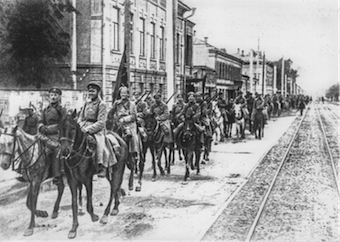This section covers the Russian civil war from 1917 to 1921. We will be asking what were the causes of the civil war? Why did the Reds win? Were they better organized than the White armies or politically ore popular? In this section we will also look at the War Communist economy and the Red Terror as factors in the Bolshevik success. We examine the popular revolts against the Bolshevik regime that led Lenin to retreat to the New Economic Policy in March 1921. The section contains extracts from my books, photographs and videos, and a reading list. Register here to get information on accessing more materials including my responses to exam questions on these themes.

Red Army Cavalry
For the Bolsheviks the civil war was a necessary phase in the revolution, a violent intensification of the class struggle. Lenin was prepared for a civil war and perhaps even welcomed it as a chance to build his party's tiny power base. Read more...
The ease of the White and Czech Legion victories made it clear to Trotsky, Commissar of War, that the Red Army had to be reformed on the model of the tsarist conscript army, with regular units replacing the Red Guards, proper discipline in the ranks, professional officers and a centralized hierarchy of command. Read more...
War Communism was the first version of the Soviet planned economy. It aimed to abolish private trade, control labour, nationalize all large-scale industry, and at its height in 1920 to replace the money system with a universal system of state rationing. Read more...
The Bolsheviks attempted to stamp out private trade and bartering which they saw as the final remnants of capitalism. By controlling the food supply and rationing they could control society. Read more...
The Soviets were transformed from local revolutionary bodies controlled by an assembly to bureaucratic organs of the party-state where all real power lay with the Bolsheviks who dominated the executives. Read more...
The Soviet press called for mass reprisals for the attempt on Lenin's life. The Cheka arrested 'bourgeois' hostages en masse. Its torture methods were notorious. Read more...
Without an effective force to resist the Red Army, it was only a matter of time before the Komuch lost its hold on the Volga region. Read more...
On 3 July Denikin issued his Moscow Directive, the order for a general attack on the Soviet capital. It was an all-or-nothing gamble, counting on the speed of the White cavalry to exploit the temporary weakness of the Reds. Read more...
The Whites proved unable and unwilling to frame policies capable of winning mass support. Read more...
Once the Whites had been defeated the peasants turned against the Bolsheviks, whose requisitionings had brought much of rural Russia to the brink of starvation. By the autumn of 1920 the whole of the country was inflamed with peasant wars. Read more...
This was the context in which the Tenth Party Congress assembled in Moscow on 8 March. Determined to the defeat the Workers' Opposition, Lenin got a vote condemning and then forced a secret resolution - one of the most fateful in the history of the Communist Party - banning factions in the party. Read more...
Nobody knows the full human cost of the civil war. By any calculation it was catastrophic. Counting only deaths from the fighting, the terror, famine and disease, it was something in the region of 10 million people. Read more...
Consider what these images tell us about civil war. Read more...
Here are some exam-like questions. Read more...
A recording of a lecture/class about these themes using primary documents. Read more...
A list of further reading. Read more...

